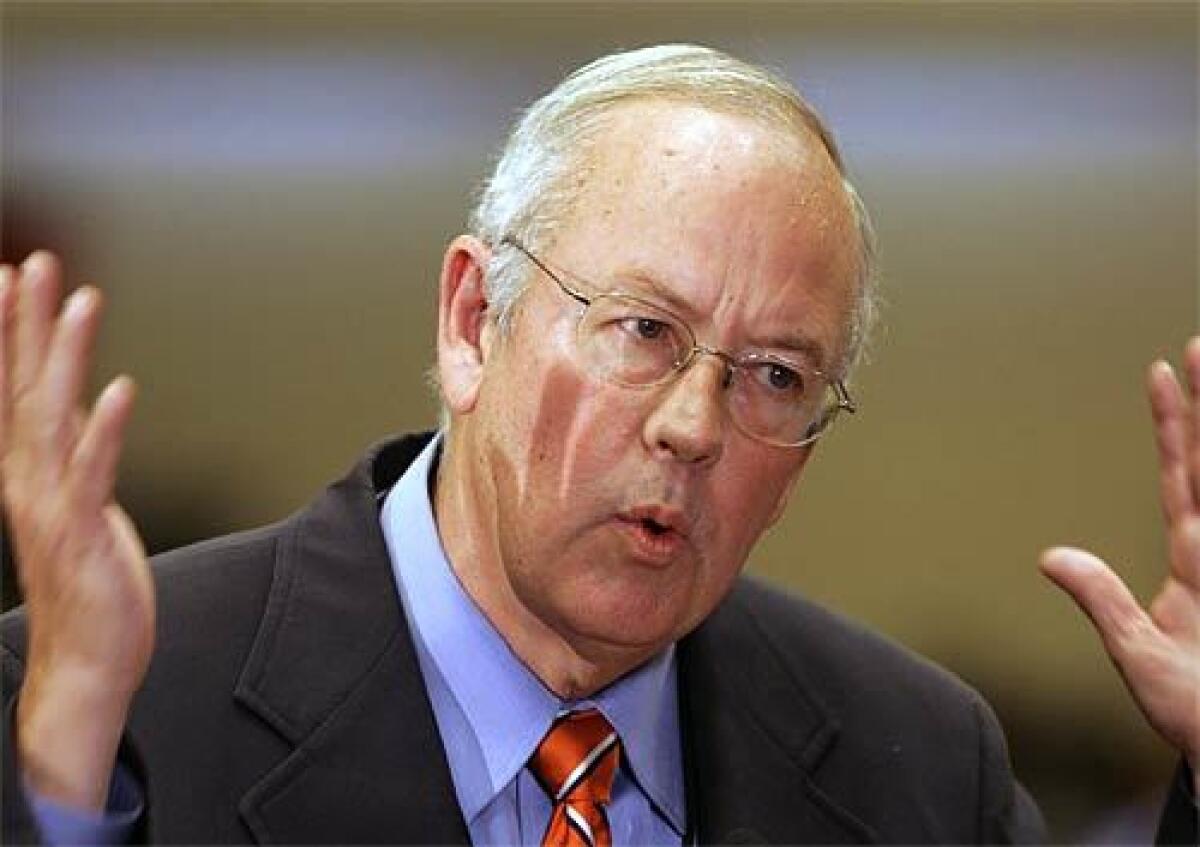Kenneth Starr, who led the drive to impeach Clinton, will now help defend Trump in Senate trial

- Share via
WASHINGTON — Kenneth W. Starr, the independent counsel who led the drive to impeach President Clinton over a sex scandal a generation ago, will now argue for dismissing impeachment charges against President Trump over his pressuring of Ukraine to investigate his leading presidential rival in the 2020 election.
Starr brings to the task solid credentials and deep ties to the Republican legal establishment.
But for Democrats and many others, he may be the least credible attorney to argue that impeachment and removal from office is the wrong remedy for a president who is accused of serious wrongdoing.
“I get why Trump thinks this is a clever legal dream team. But I’d bet this is going to backfire in a big way,” tweeted Susan Hennessey, an editor for the legal blog Lawfare. “For everything Starr says to defend Trump, there will be clips of him taking the opposite position against Clinton. It will only underscore the Republican hypocrisy.”
Paul Rosenzweig, a Washington lawyer who worked with Starr on the Clinton investigation, said he was surprised and dismayed by the news. “I find it confusing and puzzling,” he said. “It is so inconsistent with the recommendations for impeaching Bill Clinton,” which included allegations of lying, refusing to testify and taking actions to obstruct the investigation. “I cannot see how anybody who made those recommendations can defend Donald Trump’s conduct.”
Starr spent four years investigating Bill and Hillary Clinton over hazy allegations involving Arkansas real estate that became known simply as “Whitewater.” When that probe failed to yield charges against the president, Starr abruptly switched course in January 1998 when his investigators were told of Clinton’s sexual affair involving Monica Lewinsky, a former White House intern.
By the summer, Starr was preparing a massive report for the GOP-led House that cited 11 grounds for impeaching Clinton for lying and seeking to cover up the affair. Helping him with the report was a young conservative lawyer who would later go on to join the Supreme Court: Brett M. Kavanaugh.
In the fall, Starr went before the House Judiciary Committee to press the case for impeachment. In December, the full House, voting largely along party lines, approved articles of impeachment accusing Clinton of perjury and obstruction of justice. At the time, opinion polls showed that more than 60% of the public gave Clinton a favorable rating.
Starr left Washington after Clinton’s acquittal in the Senate, and he served as dean of the Pepperdine Law School in Malibu. He later become president and chancellor of Baylor University in Waco, Texas, but was pressured to step aside in 2016 after an investigation concluded he had mishandled allegations of sexual assaults involving football players.
More recently, Starr has appeared on Fox News to defend Trump against the Democrats’ drive to impeach and remove him.
Prior to his time as independent counsel, Starr had a solid reputation in Washington legal circles and was seen as a strong candidate for a Supreme Court nomination in a Republican administration.
In the 1980s, he was a top Justice Department lawyer in the Reagan administration and then a judge on the U.S. Court of Appeals for the D.C. Circuit. He left the bench in 1989 to serve as solicitor general under President George H.W. Bush. His top deputy at the time was a 34-year-old John G. Roberts Jr., who is now the chief justice of the United States and presiding over the Senate trial of Trump.
Starr hoped the job as the government’s top courtroom lawyer would lead to an appointment to the Supreme Court. But he was passed over twice, and when Clinton defeated Bush in 1992, Starr was out of a job.
Two years later, he jumped at the offer when a fellow Republican on the appeals court — Judge David Sentelle — asked him to lead the Whitewater investigation.
More to Read
Get the L.A. Times Politics newsletter
Deeply reported insights into legislation, politics and policy from Sacramento, Washington and beyond. In your inbox twice per week.
You may occasionally receive promotional content from the Los Angeles Times.










